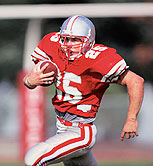- Are You Making This Expensive Thermostat Error This Winter?
- Recognizing the Signs of Hypothyroidism
- 10 Strategies to Overcome Insomnia
- Could Artificial Sweeteners Be Aging the Brain Faster?
- Techniques for Soothing Your Nervous System
- Does the Water in Your House Smell Funny? Here’s Why
- Can a Daily Dose of Apple Cider Vinegar Actually Aid Weight Loss?
- 6 Health Beverages That Can Actually Spike Your Blood Sugar
- Treatment Options for Social Anxiety Disorder
- Understanding the Connection Between Anxiety and Depression
For Many College Athletes, the Payoff Is Lifelong Disabilities: Study


Many elite college athletes are inactive later in life and it’s often due to the lingering effects of injuries they suffered during their brief college sports career, a new study contends.
The Indiana University researchers looked at 232 men and women who were former Division I athletes and 225 men and women who didn’t play high-level sports in college. The participants were between 40 and 65 years old at the time of the study.
Former Division I athletes were more than twice as likely to have physical problems that limited their daily activities and exercise. Sixty-seven percent of these former athletes said they had suffered a major injury and 50 percent said they had chronic injuries during college, compared with 28 percent and 26 percent, respectively, among non-athletes.
The study also found that 70 percent of athletes said they had practiced or played with an injury, compared with 33 percent of non-athletes. Forty percent of athletes were diagnosed with osteoarthritis after college, compared with 24 percent of non-athletes.
Previous joint injuries may increase the risk of developing osteoarthritis, the study authors said.
The former college athletes also had higher levels of depression, fatigue and poor sleep than non-athletes, according to the study, which was published recently in the American Journal of Sports Medicine.
“Division I athletes may sacrifice their future health-related quality of life for their brief athletic career in college,” lead investigator Janet Simon, a graduate student in the kinesiology department, said in a university news release.
Simon said experts such as nutritionists and strength and training coaches are available to many elite college athletes, but many of them don’t have access to such help after they graduate.
“Many of the Division I sports are not lifelong sports, so it is important for the athletes to find sports and activities that can keep them active as they age,” Simon said. “The most important thing is to stay active. You may have been a former athlete, but unless you stay active your whole life, you may be decreasing your quality of life.”
Although the study found an association between playing college sports and health problems later in life, it did not necessarily prove a cause-and-effect relationship.
More information
The U.S. National Heart, Lung, and Blood Institute offers a guide to physical activity.
Source: HealthDay
Copyright © 2026 HealthDay. All rights reserved.










